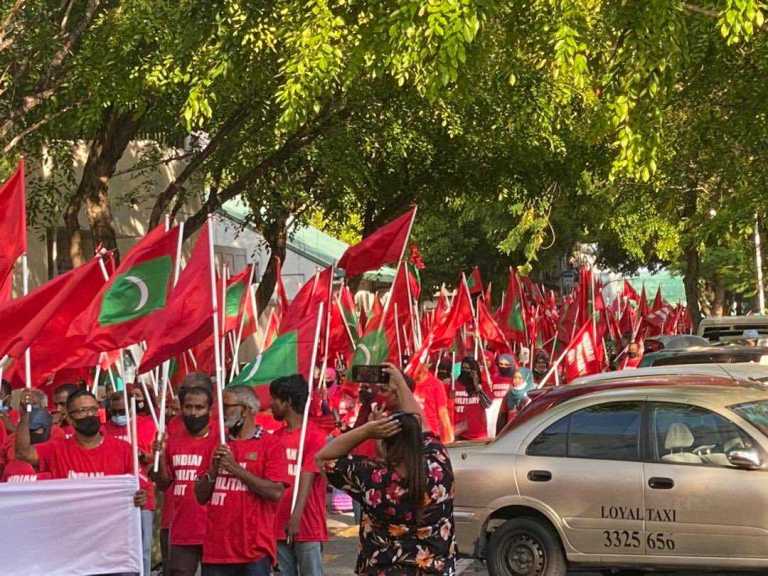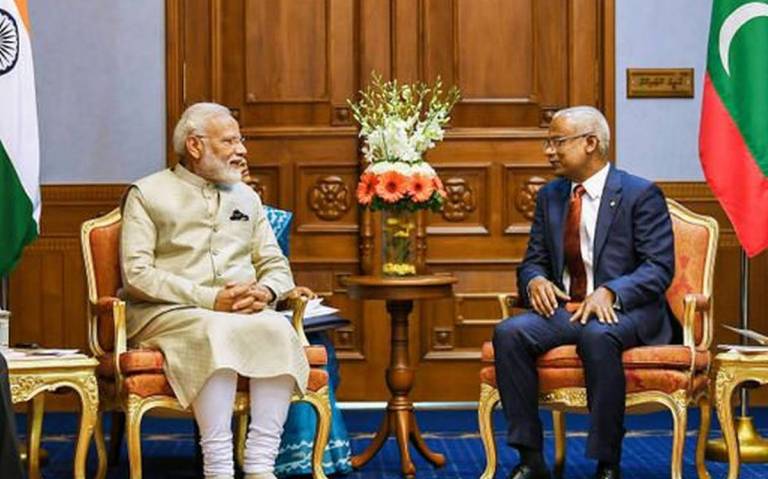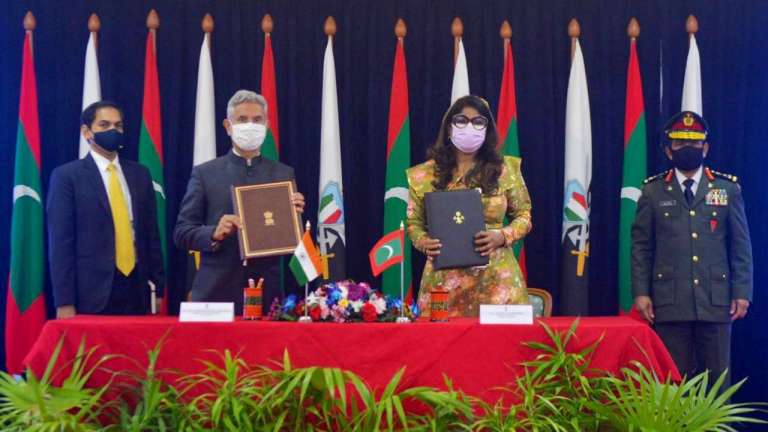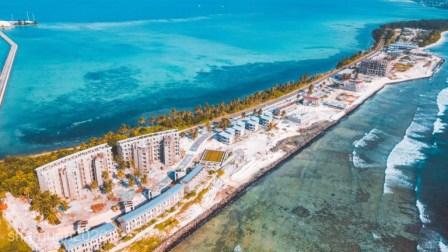On Friday, the growing resentment by the public against the Indian military presence and interference in domestic affairs was made heard as thousands marched the streets of the capital city calling “Indian Military Out”.
While the Maldives and India has traditionally have had warm ties, India’s growing hegemonic practices and their “hands-on” approach to maintaining their influence in the region has meant that the Maldives has also become the latest in line to become the subject of interest for India to assert its dominance.

Another source of criticism is the controversial role played by Sunjay Sudhir, the Indian High Commissioner to the Maldives. The Indian High Commissioner is the subject of multiple allegations ranging from allegations of corruption to bribery. Many well-known journalists have accused him of offering bribes in exchange for publishing pro-Indian content. Some have also accused him of meddling with the judiciary by offering bribes and incentives to judges.
Precursor to Indian dominance in the Maldives.
The 2018 Presidential Election was met with mixed reactions from before and after the election. Senior officials of the current administration appealed to India to take military action against the Maldives citing rigged elections. This sentiment was shared by many senior officials of the Indian Foreign Service and independent think tanks as they also reiterated that armed action may be the only solution. However, when incumbent President Ibrahim Mohamed Solih won the election, the allegations of rigging and unfair campaigning practices disappeared.
Public discomfort due to the relations between the senior officials of the current administration and India was first sparked when current ruling party President and Speaker of the Parliament Mohamed Nasheed alleged that India had meddled with the 2018 Presidential Election.
Speaking to India Today, Speaker Mohamed Nasheed stated “First of all, no one thought we would win the election. Everyone thought it would be heavily rigged, and we had no chance. But India didn’t think that. Indian officials and Indian diplomats were at it. They knew that they can create a small window, and you know, if we even get a millimeter, we knew we could go ahead and we could win the elections. So to start with, I think Indian diplomats were very clever. This is not something I usually say but they were very very clever in, in, you know there were many many unreasonable demands from us. On what India should be doing because of lack of democracy there and because everything was suppressed. But they didn’t do what we asked them to do but all sorts of other things which brought us the election.”.
While this clearly indicates that India had influenced the 2018 Presidential election, the current administration and independent state authorities continue to ignore what might be a serious breach of security and a threat to the democratic system in the Maldives.
Many have compared the situation to the alleged Russian interference in the 2016 U.S. Presidential Election.
Some argue that India’s plans to assert its influence in the Maldives dates back to former Presidnet Mohamed Nasheed’s administration when he welcomed the Indian conglomerate GMR to take over the nation’s main airport worth over $ 1 billion for an alleged $78 million. GMR was known to have actively played a role in local politics.
Indian Military Presence in the Maldives
The main source of public resentment against India stems from their continued military presence in the Maldives. Under the current administration, several secret military agreements have been signed by between the Government of Maldives and India which would essentially allow India to station their military personnel with full diplomatic immunity and tax exemption.
While the government continues to reject any application to publicize the agreements under the RTI Act, even the Parliament has been left in the dark on the exact nature of the agreement. According to the constitution of the Maldives, no foreign boots may be stationed in the Maldives without full approval of the agreement by the Parliament, posing question on the validity of the agreements.
Indian Radar Network System.
In June 2019, Indian Prime Minister Narendra Modi inaugurated the opening of the Indian Radar Network system in the Maldives. A series of 10 radar systems located at strategic points to provide “eyes for the big brother”. While it was initially stated that the radars would be used to safeguard the Special Economic Zone of the Maldives, Indian think tanks and media have alluded to other strategic uses.
According to reports from the media, the Radar Systems would be a strategic asset for India to keep an eye on the waters surrounding the Maldives. It was stated that the radars would allow India to spot Chinese military vessels and submarines travelling in the region.
Stationing and operating military assets in the Maldives would mean that it has become a point of military operation. This fact is one of the major driving forces behind the anti-Indian military sentiments in the Maldives. Some netizens have stated that were India to clash with another regional power, Maldivians would have to face collateral damages for stationing Indian military personnel and hardware in the Maldives.
Moreover, Maldives which has long remained neutral and non-aligned would be taking a side on the growing escalation between the western forces, its allies and Russia and China.
Development projects or militarizing the Maldives?
To the ire of the public, India has also taken control of multiple strategic military locations citing development projects such as the northern most Hanimaadhoo International Airport, the capital city area military base UTF and the South most city of Addu.
UTF- a strategic naval base.
The Uthuru ThilhaFalhu or UTF is one of the most strategic military naval bases in the most due to its close proximity to the capital city area and the fact that it’s surrounded by the waters of Maldives.

On 21st February 2021 Indian foreign Minister Dr. S. Jaishankar signed an agreement to develop and maintain the harbor of the UTF, a site which has been described as the last line of defense for the capital city. Months later the agreement was leaked to local newspapers which revealed that Indian military personnel at the UTF would be allowed to carry arms and live rounds. Moreover, the armed Indian soldiers would be allowed to carry out their own surveillance of the maritime boundaries of the Maldives using the facilities at UTF.
The agreement also allows for the Indian military to maintain their presence at UTF for a total of 60 years.
Addu city military base- Indian eyes on global trade routes.
The Southernmost Addu city has also become the target of the growing Indian military presence in the Maldives. The development of the training academy in Addu city has been the subject of concern for the public as India continues to expand the boundaries of the military training facility.

Sources close to the project have hinted that local military and police have little to no control over the site and what goes there. Many have accused India of developing its own military base in the strategic Addu city which sits near the equator and close to a major maritime trade route.
Photo by: SaveAddu.
Public outrage also poured out against the military base in Addu city after Indian Prime Minister Narendra Modi’s cabinet unilaterally decided to open a Consular General’s office in Addu city. This violation of the Geneva Convention on Diplomatic Relations have meant that public resentment against these breaches of sovereignty continue to grow.
Future of SAARC and SAFTA is at risk.
India growing hegemonic practices which now borderline on direct assault to the sovereignty and independence of the South Asian countries which poses serious question on the future of South Asian Association for Regional Cooperation (SAARC).
Founded in 1985, SAARC has been one of the driving forces behind the fragile peace between the member countries. Moreover, the introduction of the South Asian Free Trade Area (SAFTA), trade between the 1.6 billion people of the SAARC member countries have led to a positive socioeconomic growth for the countries.
India’s growing imperialistic and hegemonic practices pose a threat for the future of SAARC as many countries in the region face the threat of Indian military presence and domestic interference. Nepal, Bhutan and the Maldives currently have some form of Indian military stationed while Pakistan continues to face military threats from India. Sri Lanka which has largely been off the radar of India due to its decade’s long civil war has also now had to face India as a possible threat. According to media reports, former Sri Lankan President Maithiripala Sirisena stated at a cabinet meeting that he was being targeted by an assassination attempt by the Indian intelligence community. While the truth of the matter is yet to be seen, this alludes to the fact that even the senior most officials of the Sri Lankan government had concerns over Indian interference in its domestic affairs.
It is expected that a number of SAARC member countries at the 20th SAARC Summit will voice against the growing Indian military presence in the South Asian region.
Future of Indo-Maldives relations.
Maldives has enjoyed warm relations with India dating back to centuries. However, the Maldivians are a hardy and patriotic people who value their independence and religion above all other. And India’s growing military presence and interference in the domestic affairs of Maldives has undeniably provoked the ire of the Maldivian people, as evident by the thousands of people who took the streets in protest against India.
While the current administration and the New Delhi friendly President Ibrahim Mohamed Solih continue to turn a blind eye and a deaf ear to the public concerns, resentment against India will continue to grow and ultimately prove itself to be a major obstacle for diplomatic and trade relations between the two countries in the coming years.
Regardless of the weak foreign policy adopted by President Ibrahim Mohamed Solih’s administration, Indo-Maldives relations will continue to worsen if India does not remove their military personnel and hardware and if the current administration does not adopt a more transparent approach to the exact nature of relations between the current administration and India. It is imperative that India adopt a non-aggressive foreign policy for the continued harmony and relations between India and Maldives.
Post Disclaimer
Disclaimer: Growing Maldivian resentment against Indian military Presence and interference in domestic affairs - Views expressed by writers in this section are their own and do not necessarily reflect Latheefarook.com point-of-view
dont let corrupt leaders put maldives in same situation as Kashmir.
They will make base then bring in indians as colonists and pretty soon the natives will be gone